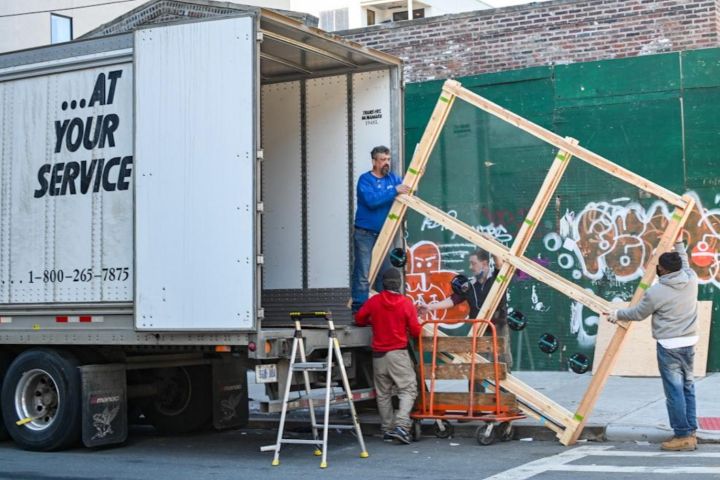People in the UK move house all the time, whether that involves moving between rented or bought accommodation. Statistics show that around 390,000 households in the UK wanted to move home as of January 2023, with 232,000 households planning to move soon. As a result, moving companies will always be in demand.
If you’re keen to set up a moving company to tap into this market, here are some things you may want to consider.
What does a moving company do?
Although moving companies tend to specialize across different areas, the basic premise involves transporting items on behalf of someone looking to move from one place to another.
However, there are additional services that can be integrated into removal services, such as packing and unpacking.
Some of the basic day-to-day activities for those working in a removals company include:
- Packing up belongings to protect items in transit
- Packing items in the transportation vehicle
- Unloading items at the end destination
- Dismantling furniture and putting it back together
- Removing packing materials
- Transporting items from one destination to the next
Certain factors can affect the cost of removal services, including the amount of staff required, the distance covered, the amount of items to be moved, whether the items are packed and unpacked or not, as well as the time of year the move takes place.
Outline your services
Defining your services is a crucial step to consider, as this will set expectations from the get-go and help to prevent you from entering tricky situations or negotiations with customers. To determine your services, you’ll need to consider your available resources and the equipment you’re willing to invest in.
Some examples of services you may want to specialize in include home removals or commercial removals. The latter will involve moving heavier equipment that you would typically find in an office space. A larger van and the ability to dismantle and reassemble furniture will be required. Meanwhile, home removals will involve moving items that may be precious to customers, so you’ll need to consider this when forming your business plan.
Once you’ve identified your core audience and services, you can dig deeper and work out what you would and wouldn’t like to include within your services. Consider the geographical area you would like to cover and the size of the property or building you’re willing to take on. Don’t overstretch yourself if this could compromise the quality of your service. Build up a strategic pricing structure to complement your services so that everyone is on the same page.
Many removals companies also offer organizing, packing and unpacking services. This means you will need the necessary packing materials so that you can confidently move items from one place to another and avoid any damage. It will also involve extra communication with your customers so that expectations are settled once the work takes place. If you have the space to do so, you could also offer storage as part of the package.
You can also use this opportunity to identify any USPs that will help you to stand out from the competition. These can be included in any marketing material you use. If you have a particular niche, make this clear so you can attract the right audience.
Legal requirements and licensing
There are several licensing and insurance requirements when setting up a removals company. All vehicles must be taxed and any lorry drivers will need a Certificate of Professional Competence (CPC). If you plan to move large items, you’ll also need a Goods Vehicle Operator Licence for your designated Traffic Areas – these are issued by the Traffic Commissioner. Otherwise, you’ll be restricted to smaller vans, which will impact how your business can operate. In short, moving will take longer and the entire process will be less efficient.
Beyond vehicle insurance, you will need to secure moving insurance for goods in transit, otherwise you risk losses that might arise if customer’s goods are damaged. Meanwhile, professional indemnity insurance can help to protect your business’s reputation and public liability insurance will cover injuries to a person or the goods while they are being transported in your vehicle.
Employing staff comes with additional responsibilities. As their employer, you will be responsible for their wellbeing at work and ensuring that the environment they’re working in is as safe as possible.
You’ll need to consider and implement health and safety regulations set out by bodies such as the Health and Safety Executive (HSE) so that everyone in the business works safely and responsibly.
The job will involve physical labour, so employers must arrange training and help staff navigate key risks. You’ll need to reduce the risk of injury to staff by ensuring everyone knows how to lift certain objects safely and navigate stairs, for example. There should be an awareness of how to adapt certain techniques in adverse weather conditions too.
Beyond manual labour involved, you’ll need to be diligent when it comes to workplace transport. This involves completing necessary vehicle checks, identifying safe routes for travel, ensuring drivers aren’t fatigued from driving long distances and of course, ensuring staff have the correct documentation and training to be able to drive certain vehicles.
If you breach your duty of care as an employer or you act negligently, causing your staff to suffer an injury, staff may be entitled to make a personal injury at work claim.
Building a reliable fleet and hiring skilled staff
Running a moving company means hiring staff and training them so that they can handle the manual labour involved. A big portion of your ongoing costs will go towards payroll and hiring expenses, so building a team you can rely on is important for business longevity and success.
They will need to show the care and precision needed when handling customer’s goods, as any damage through carelessness will frustrate the customer and could compromise the business’s reputation. Punctuality is another trait you should encourage as a team, otherwise, the logistics system in place can become compromised.
Beyond their physical capabilities, staff should be approachable and friendly to improve customer experience. This way, you can gather positive feedback and gain referrals, which will help you in your marketing efforts and secure concrete leads for the company. The more engaged your staff are, the more connections you’ll build, which is good for business.
Word of mouth and other feedback is valuable marketing collateral that will help your business remain solid.
We hope you found this blog post on A Complete Guide to Setting Up Moving Company, useful. Be sure to check out our post on Strategies to Generate Leads for Moving Companies for more great tips!
Have Experience in the Moving Industry? Want an Additional Income Stream? Work With All Around Moving!
Partner with us, moving relocation consultants, and we’ll help you make money by establishing your own moving consultant business. Click here to learn more.






